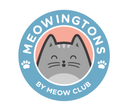Thanksgiving Foods vs Cats: What's Safe? What Isn't?
Thanksgiving is a wonderful time to get together with our furry and not-so-furry family and friends. With large spreads of food set out for everyone to enjoy, it’s also an opportunity for a sneaky cat to sample some human food while everyone is busy having fun.
While some humans find cats sampling human food funny, or not something to worry about, there are some human foods that can be a problem or even toxic for cats.
Here’s a list of cat-safe foods you can share with your cat this Thanksgiving, if you're so inclined. However, everything in moderation! A little bite or saucer of these Thanksgiving treats won't hurt - but we don't advocate for a heaping feast for your cats this holiday.
Thanksgiving Foods That Are Safe For Your Cat:
Skinless, unseasoned turkey – Turkey can actually be a healthy, lean treat for your cat. The best way to treat them is to a small helping of skinless and unseasoned white meat, but some cats might like dark meat – or even cooked giblets!
Plain pumpkin - Plain pumpkin puree is a delicious and nutritious option to give your kitties on Thanksgiving! When you’re cooking your pumpkin pie, set aside a bit of plain (no sugar or spices added) canned pumpkin puree for your feline to enjoy later.
Plain pumpkin can also aid in digestion and help with constipation in cats!
Cooked Green Beans, Peas and Carrots - These soft, cooked veggies might be a nice little treat to mix in and shouldn’t give your cat any problems, if they're into the "veggie" thing. Cats are obligate carnivores, so their digestive system is designed to break down meat, not vegetable matter. But a little green bean isn't going to hurt.
However, if the beans are part of a green bean casserole, which might be covered in onions, it’s best to skip it!
Honestly, Thanksgiving foods that are safe to share with your cat are few and far between. When in doubt, just stick to the kibble and wet food :)
Thanksgiving Foods That Are Dangerous for Cats:
Bones – You want to avoid giving your cat the leftover carcass. If a bone is swallowed, it can cause an obstruction in the cat’s gastrointestinal tract and may require surgery to remove the obstruction.
Seasoned turkey skin and Gravy – Both turkey skin and gravies can be high in salt and fat content and therefore lead to inflammation of the pancreas.
Xylitol – Used in baking, Xylitol is an artificial sweetener that is toxic to all pets. It can cause a drop in your pet’s blood sugar and most frightening it can lead to liver failure.
Alcohol – Alcohol is definitely a big no for pets, feline, canine or otherwise. What we people may consider a small amount, or just a “taste” can be toxic for your cat. Also, keep in mind that alcohol poisoning can occur in pets from atypical items like fruitcake (the recipe may have called for rum or other liquor), as well as the aforementioned uncooked dough.
For pets, alcohol consumption can lead to alcohol poisoning, coma, falling blood pressure, vomiting, loss of coordination and low body temperature.
If you want to indulge your cat in a little wine tasting, try a non-alcoholic cat wine, which is an organic blend of beet juice, catnip and cat-safe oils.
Raw Eggs – Just like humans, raw eggs can cause a cat to suffer from food poisoning from E. coli or salmonella. Raw egg whites also contain a protein, avidin, that might interfere with a cats’ ability to absorb biotin which can cause skin and coat problems.
Ham – Like other fatty foods, ham is a high-fat content food and may contain high amounts of salt, both of which are not good for cats.
Stuffing – Some ingredients in stuffing can be dangerous for cats, including garlic, chives, onions and leeks. Red blood cells carry oxygen throughout the body and these food items can the membranes of red blood cells to be damaged, leading to anemia in cats.
While these foods are typically poisonous when eaten in large quantities, exposure to concentrated forms of onion or garlic, such as onion soup mix or garlic powder, can also be toxic.
Raisins and Grapes – These can cause kidney failure in cats or make them ill.
Chocolate – All forms of chocolate are hazardous to cats including dry cocoa powder, baking chocolate, dark, semi-sweet, milk chocolate and even white chocolate can be dangerous. Symptoms of chocolate poisoning in cats includes: diarrhea, vomiting, weakness, rapid breathing, elevated temperature, muscle rigidity, increased reflex response and seizures.
If you believe your pet has ingested any of these harmful foods, contact the Animal Poison Control Center: (888) 426-4435.
While it’s fun to include our kitties in our holiday traditions, it’s important that you don't allow your pets to overindulge. Moderation is key! Too much fatty, salty food and they could wind up with a case of upset tummy (and worse, diarrhea.) It’s best to keep your cat on its regular diet during the holidays, but a table scrap now and then won’t hurt anyone!

















Leave a comment